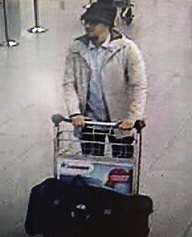Police hunt suspect after Islamic State kills 30 in Brussels suicide attacks

BRUSSELS – The self-declared Islamic State militant
group have claimed responsibility for suicide bomb attacks on Brussels airport
and a rush-hour metro train in the Belgian capital on Tuesday which killed at
least 30 people, with police hunting a suspect who fled the air terminal.
Police issued a wanted notice for a young man in a hat
who was caught on CCTV pushing a laden luggage trolley at Zaventem airport
alongside two others who, investigators said, later blew themselves up in the
terminal, killing at least 10 people.
Officials said about 20 died on the train close to
European Union institutions. Islamic State said that too was a suicide attack.
The tolls were vague because of the carnage at both sites.
The coordinated assault triggered security alerts across
Europe and drew global expressions of support, four days after Brussels police
had captured the prime surviving suspect in Islamic State’s attacks on Paris
last November in which 130 people were killed.
Belgian authorities were still checking whether the
attacks were linked to the arrest of Salah Abdeslam, said Federal Prosecutor
Frederic Van Leeuw, although Belgian security experts said the level of
organisation involved suggested they had been in preparation for more than just
a few days.
As the city began to emerge from a day of lockdown, a
major police search operation was still under way after dark in the northern
borough of Schaerbeek. Investigators said they had found a nail bomb and an
Islamic State flag in an apartment.
Private broadcaster VTM said police went to the area
after a taxi driver reported driving three people to the airport and became
suspicious when they did not let him touch their baggage.
Last week, explosives and an Islamic flag were found
during a raid on an apartment in the south of Brussels. Police also found a
fresh fingerprint of Abdeslam’s there, putting them on to his trail. It was not
clear if Abdeslam had been involved at that stage in planning the airport
attack.
‘CALIPHATE
SOLDIERS’
In a statement, Islamic State said “caliphate
soldiers, strapped with suicide vests and carrying explosive devices and
machineguns” had targeted the airport and metro station, adding that they
had set off their vests amidst the crowds.
It was not clear, however, that the attackers used
vests. The suspects were photographed pushing bags on trolleys and witnesses
said many of the airport dead and wounded were hit mostly in the legs, possibly
indicating blasts at floor level.
“A photograph of three male suspects was taken at
Zaventem. Two of them seem to have committed suicide attacks. The third,
wearing a light-coloured jacket and a hat, is actively being sought,”
prosecutor Leeuw told a news conference.
A government official said the third suspect had been
seen running away from the airport building. Police later found and detonated a
third explosive device at the airport.
Security commentators noted that the two men in dark
clothes who officials said had died were both wearing gloves on their left
hands only. One expert speculated they might have concealed detonators. The man
in the hat was not wearing any gloves.
“If you recognise this individual or if you have
information on this attack, please contact the investigators,” a police
wanted notice for the third man read. “Discretion assured.”
Belgian police appealed to travellers who had been at
the airport and metro station to send in any photographs taken before the
attacks in their efforts to identify the bombers.
After questioning Abdeslam, police issued a wanted
notice on Monday, identifying 25-year-old Najim Laachraoui as linked to the
Paris attacks. The poor quality of Tuesday’s CCTV images and of the Laachraoui
wanted poster left open whether he might be the person caught on the airport
cameras.
Citizens of the United States, Spain and Sweden were
among the injured, their governments reported.
SHOUTS
IN ARABIC
A witness said he heard shouts in Arabic and shots
shortly before two blasts struck in a crowded airport departure lounge at the
airport. Belgian media said police found a Kalashnikov assault rifle next to
the body of an attacker.
A lockdown imposed after the attacks was eased and
commuters and students headed home as public transport partially reopened.
Islamic State, which controls parts of Iraq and Syria
and has supporters and sympathisers around the world, said: “We promise
the crusader alliance against the Islamic State that they will have black days
in return for their aggression against the Islamic State.”
Belgium, home to the EU and the headquarters of the NATO
military alliance, has sent warplanes to take part in operations against Islamic
State in the Middle East.
– Reuters


